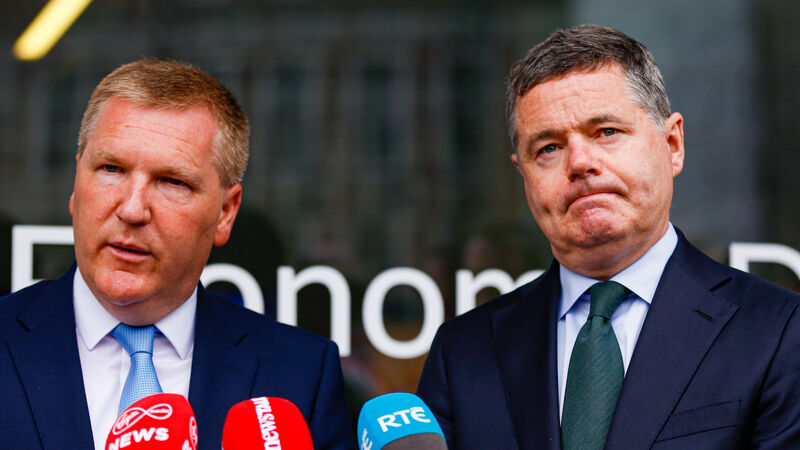Ministers hint Government will stick to budget spending rules

Minister for Public Expenditure and Reform Paschal Donohoe (right) and Minister for Finance Michael McGrath at the National Economic Dialogue conference in Dublin Castle.
Public Expenditure Minister Paschal Donohoe has hinted against a giveaway budget later this year suggesting the Government will stick to its target of 5% annual expenditure growth.
Last week, the Irish Fiscal Advisory Council (IFAC) advised the Government not to use excess corporation tax receipts to fund additional spending which it said could not be justified at this time.
The council estimates that the Government will have more than €4bn in additional expenditure to use in the upcoming budget. However, according to the report, the estimated “stand-still” costs for Budget 2024 is €5.6bn which is €1.3bn more than projected under the spending rule.
Speaking on Monday at the opening of the National Economic Dialogue, Mr Donohoe said the Government does have an expenditure growth target of 5% which “avoids the risk of spending money that we might not have tomorrow and avoids other risks”.
"What will be a really important decision for the Government to make is how can we have a responsible level of public expenditure growth within our economy that does what it can to respond back to the issues of today but critically does not spend money that we run the risk of not having in the years ahead,” he said.
He warned that by the end of the decade, the country is expected to be spending €9bn more to match current levels of service provision largely due to the ageing population.
Finance Minister Michael McGrath said there is a “mixed economic outlook” with the public finances having “underlying vulnerabilities” on top of the structural pressures over the medium and long-term.
"The economic outlook remains clouded by uncertainty and it is clear as economists would say that the risks are tilted to the downside.
Mr McGrath said the most obvious vulnerability would be the increasing reliance on volatile corporation tax receipts.
He said protecting against the risks associated with windfall corporate tax means a prudent budgetary policy that is “sustainable” and “balanced between continued investment in our public services and the long-term stability of our public finances”.
In terms of priorities in the budget, Mr McGrath cited the need for more public housing, protecting people’s living standards and continuing to invest in public services and public infrastructure.
The National Economic Dialogue is the forum for public consultation and discussion on the Budget.





